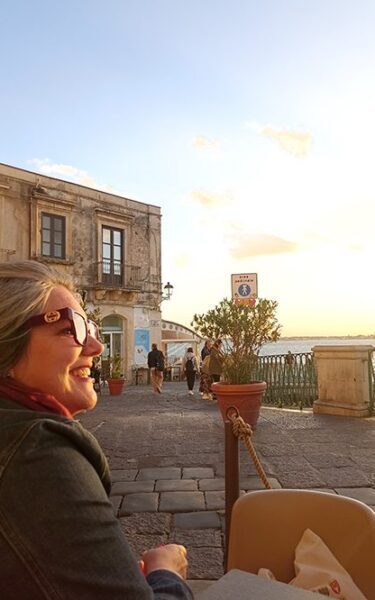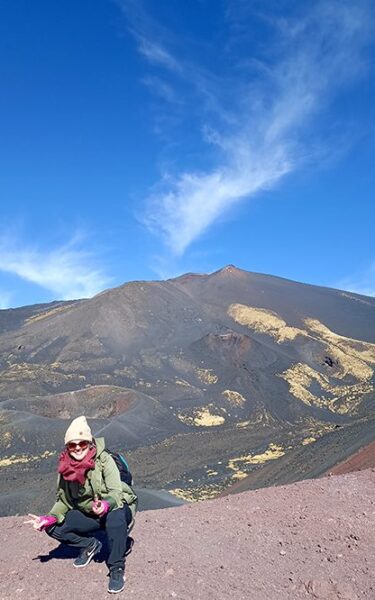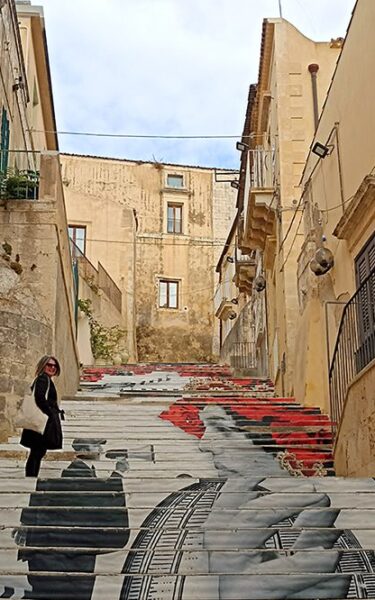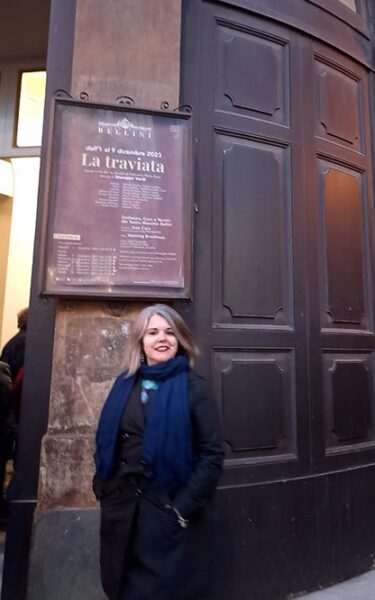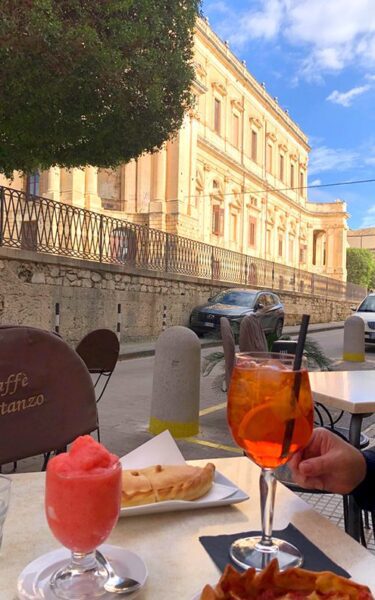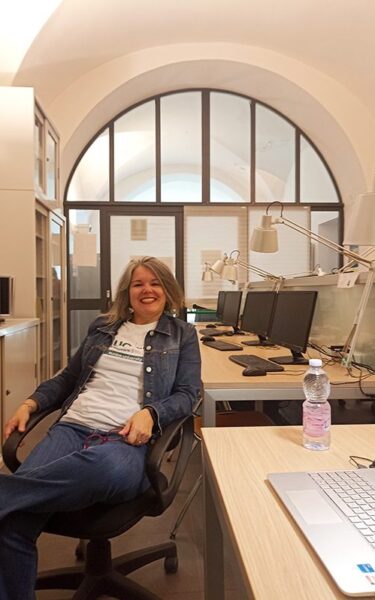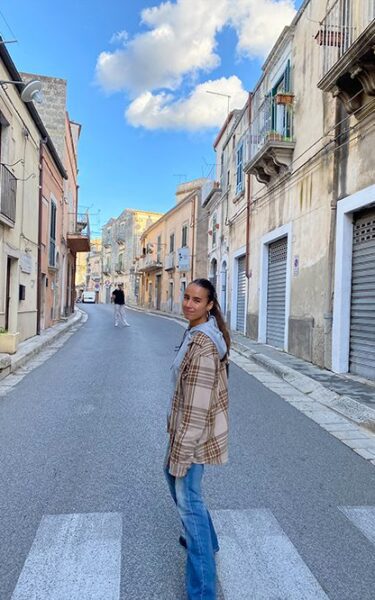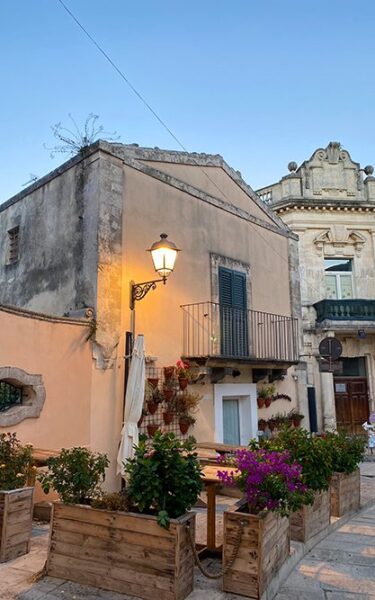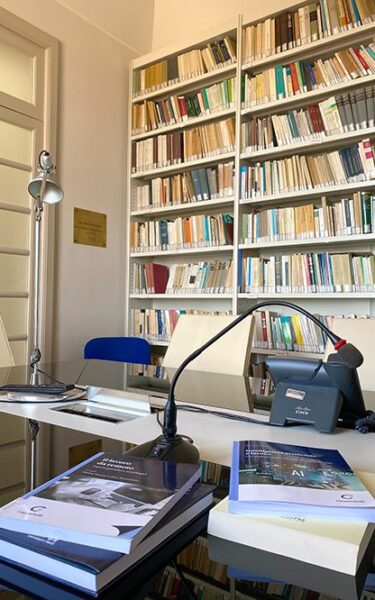INTERVIEW | Fabiola Baquero and Raquel Coterillo, PhD candidates at University of Cantabria (Spain) in the Innovation and Equity in Education and the Legal and Business Sciences doctoral programmes, respectively, have carried out an international stay for the development of their doctoral theses. Both research mobilities took place at the University of Catania, in Sicily -Italy-, within the framework of the Reunice project.
Research staff mobility between EUNICE universities aims to foster the establishment of new collaborations in research projects. This sort of mobilities facilitates the creation of “new professional contact networks, that will allow you to grow academically,” said Raquel Coterillo. Fabiola Baquero highlighted its benefits in terms of “academic production” and “professional qualification.”
Fabiola Baquero
PhD candidate in Innovation and Equity in Education
University of Cantabria | Education Department
Mobility: Department of Educational Sciences, University of Catania | November 2023
Raquel Coterillo
PhD candidate in Legal and Business Sciences
University of Cantabria | Department of Labour and Social Security Law
Mobility: Institute of Labour Law, University of Catania | November 2023
1. What are your doctoral theses about?
F. Baquero: My thesis consists of the study of the school inclusion of teenagers with high intellectual abilities in the region of Cantabria. I seek to evaluate the motivations and the emotional and social aspects of students with high intellectual abilities who participated in a university mentoring programme called Amentúrate at the University of Cantabria.
R. Coterillo: My thesis seeks to address the impact of Artificial Intelligence on the labour market from a gender perspective. The current technological change seems to predict a greater automation of tasks, but no consensus has yet been reached on its effects in the short and medium term. My thesis aims to analyse the impact that automation will have on the labour market in different countries and sectors. It will also generate empirical evidence on current digital divides, aiming to push policy-makers to act.
2. What effects might the results of your research projects have on society or on other research projects?
F. Baquero: My research acknowledges human potential as one of the most precious natural resources that society has, and therefore the need to protect it. It is important to understand the onset of high intellectual abilities from an early age in order to facilitate the full development of the person, to guarantee individual well-being and to enhance the contribution of these persons to society. Studies on this subject show the need to promote teacher training and to strengthen support networks for individual development and, thus, for the progress of the community.
R. Coterillo: This is an absolutely topical subject. More and more AI tools are emerging and the role of the worker is weakening. With this research project, I seek to justify the need to give back to trade unions the power they have lost and to reinforce collective negotiations in order for workers to adapt to the new productive realities. I also aim to provide a critical view of the tools that monitor workers’ performance, which destroy their trust in the employer and lead to illnesses such as burnout and technostress. I seek to draw conclusions and recommendations, generate criticism and contribute with new approaches.
3. Why did you choose the University of Catania as the destination for your stays?
F. Baquero: Among the EUNICE universities, Catania was the one that best met my logistical and educational needs. I took into consideration the geopolitical history and the rich Sicilian culture, as it is a different, vibrant and lively educational context. I believed that this environment would give me opportunities to learn about inclusive educational processes throughout life, as well as about how to care for local talents.
R. Coterillo: Among the various universities involved in the Reunice project, the University of Catania stood out for its prestige and research activity. Moreover, I had previously studied in Italy: I spent one year at the University of Naples Federico II. I was already familiar with the country’s legal system, culture and language. I feel deeply connected to Italy and therefore I wanted to establish networks and possible future collaborations.
4. What knowledge related to your theses have you acquired during these mobilities?
F. Baquero: I participated in the seminar on the Forest School, an outdoor education model in which students visit natural spaces to learn personal, social and technical skills. I was not familiar with such schools. I also participated in the elaboration of a training proposal for professors of a technical school in Catania, linked to the topic of Artificial Intelligence. The initiative aims to avoid school exclusion.
R. Coterillo: Dr. Ricci and the professors in his department have provided me with a solid database on the field of my thesis, and I was able to learn about events and access multiple journals specialised in this field of research.
5. What benefits have these stays brought to the development of your theses and/or your professional careers?
F. Baquero: The expertise exchange between different cultures encourages the diversity of approaches to tackle a problem. Together with Professor Roberta Piazza, I was able to deepen my knowledge on lifelong learning and to learn about the projects developed by the Department of Educational Sciences at the University of Catania. I later discovered that Professor Piazza was involved in a research project in collaboration with Professor Teresa Susinos from UC.
R. Coterillo: I will create an article in a Spanish journal and another one in Italian about the duty to inform and consult employees about their superiors’ plans to implement AI systems in the company, in particular through the transposition of article 1-bis of the Transparency Decree of the Spanish law. In addition, the faculty I worked with in Catania has proposed me to participate in one of their journals, as well as to come back for another stay.
6. What are the advantages and disadvantages of international research collaboration between universities?
F. Baquero: It allows you to establish connections with fellow researchers to foster a collaborative network, as well as relationships with Erasmus students, PhD students and other university professionals. It favours greater fluency in languages and promotes academic production and professional qualification. It is also interesting to learn about the bureaucratic procedures of other universities and countries to access knowledge.
R. Coterillo: International research collaboration opens your mind, forces you to come out of your comfort zone, to interact in another language and to adapt to another culture. This helps you to develop both as an academic and as a person. You get to know another reality, which makes you rethink your beliefs, perspectives and methods, and also to create new professional contact networks, that will allow you to grow academically. Without foreign contacts, your vision remains limited.
7. How did you find out about EUNICE?
F. Baquero: I have been a member of the volunteer student group of EUNICE at the University of Cantabria for three years.
R. Coterillo: Thanks to EUNICE Courses. In fact, I attended a course related to my thesis at the University of Vaasa (Finland).
8. In general, what value have your stays at the University of Catania brought you from a professional point of view? And from a personal point of view?
F. Baquero: As a professional, it has provided me with a unique learning opportunity and, personally, it has been an experience I will never forget in my whole life.
R. Coterillo: It has made me mature personally and academically, opening my vision in my doctoral thesis. I have created networks that will allow me to gain academic merit, and I have improved my level of Italian. EUNICE is doing a great job, helping universities to open up to the world and fostering doctoral mobility and multidisciplinary research.


